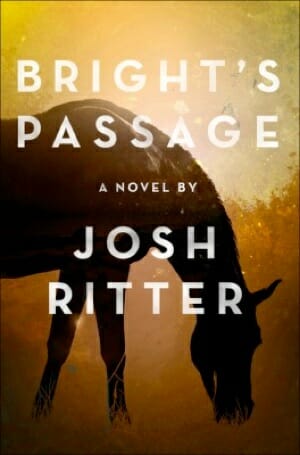Bright’s Passage by Josh Ritter

Story is God.
Most every human thing we apprehend—our values, our cultures, our very belief systems—settles into us through storytelling. We human animals are made of our stories as much as of flesh and blood—if nature is flesh and blood, nurture is story. Our enduring lore and lessons arrive as story, make best sense to us told as story. The great tapestry of our consciousness, closely examined, comprises little threads of story woven day after day into shape and design and meaning.
Every one among us is a storyteller. When we stand at the closet door selecting the tie to put on for a day at the office, we prepare to tell our story. The words we rehearse in our heads to woo the pretty girl in class … those are a story. Through story, we learn faith, or learn to give up on faith. Story teaches us not to touch hot coals, not to cry wolf. Our haircuts, our tattoos, our front yards … all offer our story. Story blinks in the billboards of Times Square and in the cars we choose to drive and in the covers of books and in the commercials we see on TV between still more stories of the walking dead or the housewives of hellish suburbs.
Some among us have special gifts for telling stories. These people inevitably become our leaders, our artists. The stories may be political, or athletic or financial. They may be conveyed by media or word-of-mouth or tweet. Stories come in barroom whispers, in full-page ads. Some stories appear in soaring libretti or on stretched canvases, the musical notes or vibrant oils arcing from some artist’s soul to a detonation of meaning and feeling in a distant fellow observer.
Josh Ritter has for years been one of our notable storytellers. He’s known as a musician, a songsmith who launches tales on currents of tune, sending out little story-vessels to ports of call in the heads of the kind of indie demographic listeners who read Paste. Ritter’s albums overflow with yarns and parables that entertain and intrigue in equal measure.
Now Ritter has written a novel, Bright’s Passage. He adds a chapter, or several if you want to be literal, to his storyteller role. He’s to be taken seriously. A talented fiction writer has slipped into the world through one of the thin places between song and literature.
It might be instructive here to see how flimsy the membrane between the two story-telling forms can be. Here’s a stanza from one of Ritter’s musical stories, lyrics to the song “Thin Blue Flame,” from The Animal Years:
“I became a thin blue stream / The smoke between asleep and dreams / And in that clear blue undertow / I saw Royal City far below / Borders soft with refugees / Streets a’swimming with amputees / It’s a Bible or a bullet they put over your heart / It’s getting harder and harder to tell them apart / Days are nights and the nights are long / Beating hearts blossom into walking bombs / And those still looking in the clear blue sky for a sign / Get missiles from so high they might as well be divine / Now the wolves are howling at our door / Singing ’bout vengeance like it’s the joy of the Lord / Bringing justice to the enemies not the other way round / They’re guilty when killed and they’re killed where they’re found / If what’s loosed on earth will be loosed up on high / It’s a Hell of a Heaven we must go to when we die / Where even Laurel begs Hardy for vengeance please / The fat man is crying on his hands and his knees / Back in the peacetime he caught roses on the stage / Now he twists indecision takes bourbon for rage / Lead pellets peppering aluminum / Halcyon, laudanum and Opium / Sings kiss thee hardy this poisoned cup / His winding sheet is busy winding up / In darkness he looks for the light that has died / But you need faith for the same reasons that it’s so hard to find / And this whole thing is headed for a terrible wreck / And like good tragedy that’s what we expect.”
Read here, for comparison, an early paragraph from Bright’s Passage:
“Five hours after darkness fell, they sat in lines against the trench wall and listened to the random fire of ammunition for miles to either side. It began to rain again, though at times star shells would brightly illumine the ground, as if the moon were making bayonet lunges at the earth. The rain slapped at the earth in weary, unwelcome applause. Finally, Sergeant Carlson heaved himself off the trench wall. Bright and the two others he had chosen did the same, climbing into the dung-colored burlap they wore to blend in against that hummocked and devastated ground of the battlefield. They climbed over the top of the trench and out into the open, moving slowly on their bellies as if the slurry of mud and bodies, wire and spent casings, were in reality only a thin layer of ice that might at any moment shatter and fall away into an abyss beneath them.”
The link is obvious. The glowing poetry. A knack for turning the dreamed into the sharply visual. Also, more than anything else, the narrative—the scene-making, the storytelling.
-

-

-

-

-

-

-

-

-

-

-

-

-

-

-

-

-

-

-

-

-

-

-

-

-

-

-

-

-

-

-

-

-

-

-

-

-

-

-

-








































